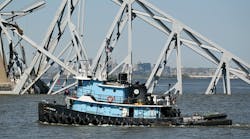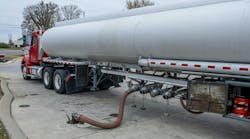Seven demonstration trucks that can all be driven without emitting any environmentally harmful carbon dioxide were exhibited for the first time this week in Stockholm, Sweden. Produced by the Volvo Group, the new trucks are equipped with diesel engines that have been modified to operate on seven different types of renewable liquid and gaseous fuels, including biodiesel, biogas combined with biodiesel, ethanol/methanol, DME, synthetic diesel and hydrogen gas combined with biogas.
The Volvo FM trucks are equipped with Volvo’s own 9-liter engines that have been specially modified by the Group’s engineers to illustrate the possibilities of carbon-dioxide-free transportation. “As one of the world’s largest manufacturers of heavy trucks, diesel engines and buses, the Volvo Group is part of the climate problem,” noted Leif Johansson, CEO of the Volvo Group. “But environmental issues are one of the areas which we have assigned the very highest priority, and based on our resources and knowledge, we both can and will be part of the solution.
“With these vehicles, we have shown that Volvo is ready, that we possess the technology and the resources for carbon-dioxide-free transport, but we cannot do this alone,” Johansson continued. “We also require large-scale production of renewable fuels and putting such production in operation requires extensive investments in research and development, and also well-defined, common guidelines from authorities in as many countries as possible.”
“We know that in the foreseeable future there will be insufficient biomass or renewable fuels to fully replace fossil fuels,” added Jan-Eric Sundgren, a member of Volvo Group management and sr. vp, public & environmental affairs. “That is why it is important that decisions on the production of future fuels are preceded by such comprehensive assessments – otherwise there is the risk that we focus on too many and, quite simply, unsuitable alternatives, which will delay the introduction of carbon dioxide-free transport.
“The diesel engine is an extremely efficient energy converter that is perfectly suited to many different renewable fuels, liquid or gaseous,” Sundgren said. “With our know-how in engine technology and our large volumes, we can manufacture engines for several different renewable fuels, and also create possibilities for carbon-dioxide-free transports in such other product areas as buses, construction equipment and boats.”
Information on alternative fuels is available from the Volvo Group online.


